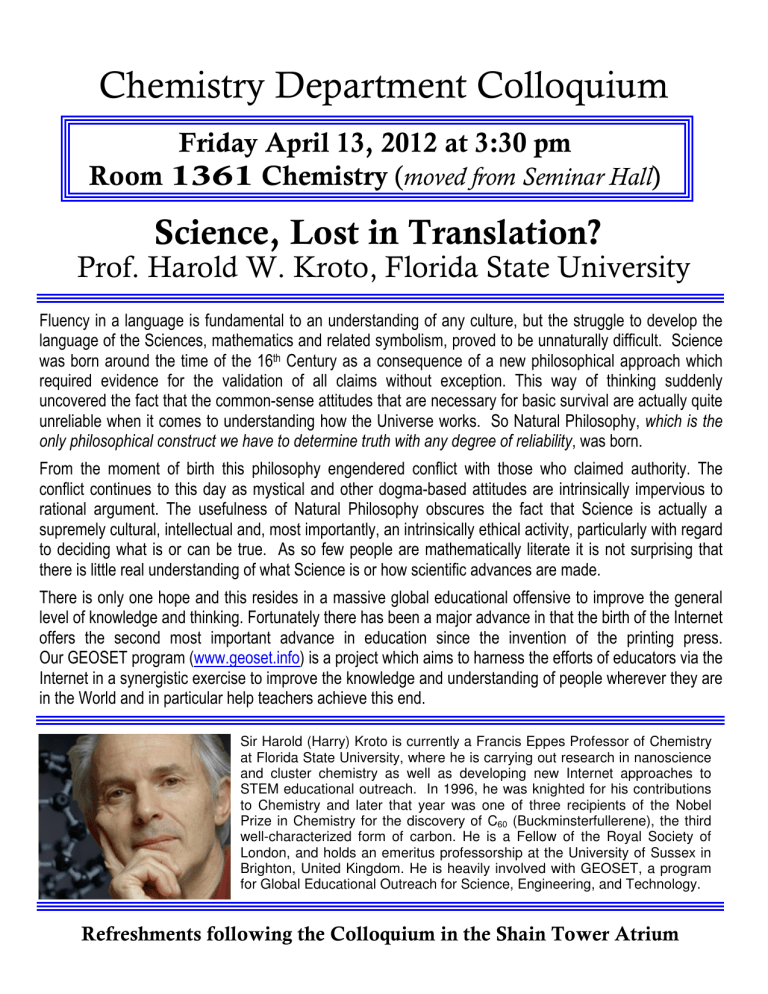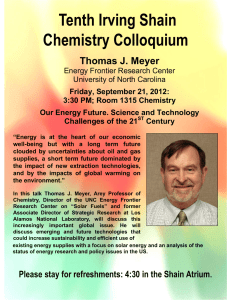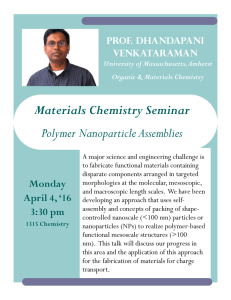Chemistry Department Colloquium Science, Lost in Translation?

Chemistry Department Colloquium
Friday April 13, 2012 at 3:30 pm
Room 1361 Chemistry
(
moved from Seminar Hall
)
Science, Lost in Translation?
Prof. Harold W. Kroto, Florida State University
Fluency in a language is fundamental to an understanding of any culture, but the struggle to develop the language of the Sciences, mathematics and related symbolism, proved to be unnaturally difficult. Science was born around the time of the 16 th Century as a consequence of a new philosophical approach which required evidence for the validation of all claims without exception. This way of thinking suddenly uncovered the fact that the common-sense attitudes that are necessary for basic survival are actually quite unreliable when it comes to understanding how the Universe works. So Natural Philosophy, which is the only philosophical construct we have to determine truth with any degree of reliability , was born.
From the moment of birth this philosophy engendered conflict with those who claimed authority. The conflict continues to this day as mystical and other dogma-based attitudes are intrinsically impervious to rational argument. The usefulness of Natural Philosophy obscures the fact that Science is actually a supremely cultural, intellectual and, most importantly, an intrinsically ethical activity, particularly with regard to deciding what is or can be true. As so few people are mathematically literate it is not surprising that there is little real understanding of what Science is or how scientific advances are made.
There is only one hope and this resides in a massive global educational offensive to improve the general level of knowledge and thinking. Fortunately there has been a major advance in that the birth of the Internet offers the second most important advance in education since the invention of the printing press.
Our GEOSET program ( www.geoset.info
) is a project which aims to harness the efforts of educators via the
Internet in a synergistic exercise to improve the knowledge and understanding of people wherever they are in the World and in particular help teachers achieve this end.
Sir Harold (Harry) Kroto is currently a Francis Eppes Professor of Chemistry at Florida State University, where he is carrying out research in nanoscience and cluster chemistry as well as developing new Internet approaches to
STEM educational outreach. In 1996, he was knighted for his contributions to Chemistry and later that year was one of three recipients of the Nobel
Prize in Chemistry for the discovery of C
60
(Buckminsterfullerene), the third well-characterized form of carbon. He is a Fellow of the Royal Society of
London, and holds an emeritus professorship at the University of Sussex in
Brighton, United Kingdom. He is heavily involved with GEOSET, a program for Global Educational Outreach for Science, Engineering, and Technology.



